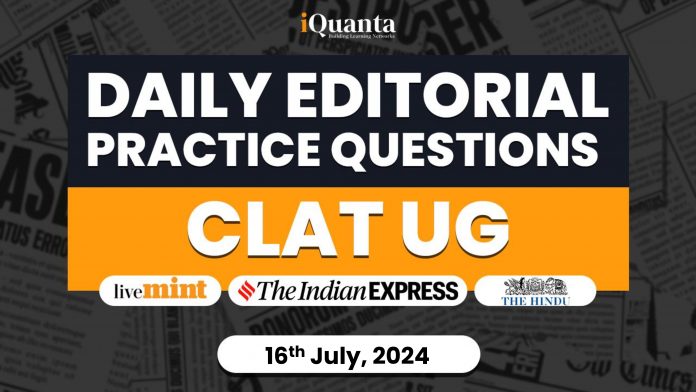Passage 1
History offers invaluable lessons on how to keep from repeating the mistakes that led to the lowest points in our past. The imposition of Emergency is one such dark episode that continues to guide present and future generations, given its implications for democracy and the right of citizens to live with dignity.
This year marks the beginning of the 50th year since the imposition of Emergency on June 25, 1975. It was imposed because of the political insecurity of the then Prime Minister, not because of any genuine “internal disturbance”. Many factors were making the PM’s position untenable at the time. Among them were concentration of power in the hands of one leader, lack of respect for democratic functioning, a culture of sycophancy, corruption in the vital organs of the state and the undermining of constitutional organs like the judiciary. The first lesson to be learnt from the dark saga of Emergency is how not to govern the state. Our Constitution mandates democratic governance based on people’s participation, wider consultations and consensus, conformity with the spirit and provisions of the Constitution and compliance with the laws made by the legislature. Despotism has no place in democracy. The period from 1971 to 1975 saw brazen violations of all conventions of democracy. People’s resentment against growing misrule and abuse of power was misunderstood as a threat to despotic rule. The Supreme Court’s judgments in Golaknath and Kesavananda Bharati in defence of the basic rules and framework of the Constitution and in support of the fundamental rights of citizens were taken as serious threats to rule by an individual.
An elected ruler can’t afford to have an unclean mind and hands. She or he should rule in the best interests of the people, in true democratic spirit, within the constitutional framework, not in personal interest and for aggrandisement.
The second lesson is that people, including the poor, do not live by bread alone and that they draw greater meaning from their lives. They want to live with dignity and self-respect too. They value their right to freedom of speech, their right to life, etc. They won’t tolerate any infringement on fundamental rights guaranteed by the Constitution. India was poorer and more illiterate than now. In the general elections that followed, the poor and illiterate Indians revolted against the excesses of the Emergency and voted in the first-ever non-Congress government at the Centre. Individual rights that accord dignity to life are as important to people as their daily bread.
Source: https://indianexpress.com/article/opinion/columns/50-years-after
Get CLAT Online Coaching!

Passage 2
The decision of the BJP to repeat Om Birla, the Speaker of the 17th Lok Sabha, for the office is of a piece with its intent to project stability and continuity in government. He was elected on Wednesday by a voice vote, The election, a departure from the convention of nearly half a century, also marks a lost opportunity for the government to build bridges with the Opposition. All that the treasury benches needed to do was to assure the Opposition that it would concede to the latter’s choice for the office of the deputy speaker, a convention followed until 2014. Such a gesture would have helped the new House to begin on a clean slate and bury the bitterness that defined the relations between the government and the Opposition in the last term. Speaker Birla could do well to recognise the sentiment in the speeches of the Opposition leaders who congratulated him on his appointment. Samajwadi Party leader Akhilesh Yadav may have spoken for all of the Opposition when he said, “We expect that the Opposition’s voice won’t be crushed in the House.” And the new Leader of the Opposition Rahul Gandhi offered a hand of friendship: “Opposition would like to assist you in your work. I am confident you will allow us to speak in the House.” The 17th Lok Sabha witnessed many acrimonious scenes and the perception of the Speaker as a non-partisan arbitrator of parliamentary proceedings took a hit following a flurry of suspensions of members: The last winter session of Parliament saw 146 MPs, all from the emaciated Opposition, getting suspended, 78 of them in a single day. In this chaos, many important legislations were turned into law without necessary debate or scrutiny. The new House has a completely different look: A 236-member strong Opposition will be a different challenge for a 293-member NDA. It will require skillful floor management by the treasury benches if the House is to deliver on its mandate. Speaker Birla’s inaugural address to the House was ominous as he invoked the Emergency to say that the then Prime Minister Indira Gandhi had imposed dictatorship on the country. The government can still retrieve lost ground – the onus on ensuring the smooth running of Parliament rests with the treasury benches – by inviting the Opposition to nominate the deputy speaker. A harmonious Parliament with bipartisan consensus is a welcome, and possible, idea.
Source: https://www.hindustantimes.com/editorials/house-keys-with-speaker-


